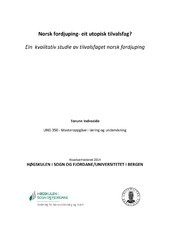| dc.contributor.author | Indreeide, Torunn | |
| dc.date.accessioned | 2014-12-17T13:17:40Z | |
| dc.date.available | 2014-12-17T13:17:40Z | |
| dc.date.issued | 2014-11-16 | eng |
| dc.date.submitted | 2014-11-16 | eng |
| dc.identifier.uri | https://hdl.handle.net/1956/8957 | |
| dc.description.abstract | When the National Curriculum for Knowledge Promotion was made public in 2006, a greater focus on the core curriculum in school was promoted. Practical Projects, a central part of the curriculum of 1997, was taken out. With the Knowledge Promotion students were given 2 options concerning electives. They could choose a second foreign language in addition to ordinary English, or they could choose In-depth studies in Norwegian, English or in the Sami language. For students who were not academic strong and had second thoughts about learning another foreign language, the “easiest” choice was In-depth studies in Norwegian. It is on this subject my research and studies have been done. In Report No. 44 to the Storting (2008-2009) Education Strategy the challenges concerning electives and foreign language studies is a central topic and the report suggests trying to give the students at lower-secondary schools a new more practical oriented elective, vocational training. Introducing the new vocational training study may be included in a long ongoing debate concerning schools, dealing with the question if a strong academic focus has neglected some students with a need for a more practical approach to learning, or not. This is a qualitative study, divided in two parts. The first part is aimed at how In-Depth studies of Norwegian is expressed in the curriculum of 1997 and 2006. The findings here are presented in a content analysis. In the second part, the perspective is how teachers operationalize the competence aims in In-depth studies of Norwegian in the Knowledge Promotion. Five teachers from two different counties and three different municipalities in western Norway are interviewed. The findings indicate that teachers manoeuvres within their field as teachers when they operationalize competence aims in In-Depth studies of Norwegian. Adapted teaching is very central for all my informants and the process of operationalising is very much a question of creating a method and adapting the content to fit the preconditions of the students. My informants are able to meet the students at their level, but all claim that the competence aims of the Knowledge Promotion are too ambitious. In the few years that have passed since I first thought about doing this research, there have been many changes. The Knowledge Promotion has been revised, and new electives have been introduced at school. Starting August 2015 the new study Vocational Training will be a permanent option all schools shall offer their students. | en_US |
| dc.description.abstract | Norsk fordjuping- eit utopisk tilvalsfag? Då Kunnskapsløftet kom i 2006 fekk skulen fokus på grunnleggande ferdigheiter. Praktisk prosjektarbeid, som var ein sentral del i læreplanen av 1997, forsvann ut av skulen. Med Kunnskapsløftet fekk elevane to mogelegheiter når det gjaldt tilvalsfaga. Dei kunne velje eit andre framandspråk i tillegg til ordinær engelsk, eller dei kunne velje fordjuping i engelsk, norsk eller samisk. For dei elevane som ikkje var så teoretisk sterke og kvidde seg for å starte på eit nytt framandspråk, vart det «enklaste» tilvalsfaget norsk fordjuping. Det er dette faget denne studien rettar seg mot. I Stortingsmelding nr. 44 (2008-2009) Utdanningslinja er problematikken kring tilvalsfaga og framandspråk eit aktuelt tema og meldinga opnar for forsøk med å gi elevane på ungdomsskulen eit nytt praktisk valfag, arbeidslivsfaget. Innføringa av det nye arbeidslivsfaget kan bli sett i samanheng med ein lengre skulepolitisk debatt, der temaet er om det sterke teorifokuset har teke lite omsyn til at enkelte elevar kan ha trong for praktiske fag. Dette er ein kvalitativ studie, der studien har ei todeling. Den første delen rettar søkelys på korleis norsk fordjuping kjem til uttrykk i læreplanane av 1997 og 2006. Funna her vert presentert gjennom ei innhaldsanalyse. I den andre delen er perspektivet korleis lærarane operasjonaliserer kompetansemåla i norsk fordjuping i Kunnskapsløftet. Fem lærarar i to ulike fylke og tre forskjellige kommunar på Vestlandet er intervjua. Funna tyder på at lærarane utnyttar handlingsrommet dei har som lærarar når dei operasjonaliserer kompetansemåla i norsk fordjuping. Tilpassa opplæring er svært sentralt for alle mine informantar og operasjonaliseringsprosessen går ut på å lage undervisingsopplegg utifrå føresetnadane til elevane. Informantane mine klarer å møte elevane på deira nivå, men alle hevdar at kompetansemåla i Kunnskapsløftet er altfor ambisiøse. På dei få åra som har gått sidan eg fekk tanken om å starte på denne studien, har det skjedd mange endringar. Kunnskapsløftet har blitt revidert, og nye valfag har kome inn i skulen. Frå august 2015 er det nye arbeidslivsfaget ei permanent ordning som alle skular skal ha tilbod om. | en_US |
| dc.format.extent | 1047536 bytes | eng |
| dc.format.mimetype | application/pdf | eng |
| dc.language.iso | nno | eng |
| dc.publisher | The University of Bergen | eng |
| dc.subject | norsk fordypning | |
| dc.subject | ungdomsskolen | |
| dc.subject | arbeidslivsfaget | |
| dc.title | Norsk fordjuping- eit utopisk tilvalsfag? Ein kvalitativ studie av tilvalsfaget norsk fordjuping | eng |
| dc.type | Master thesis | |
| dc.rights.holder | Copyright the author. All rights reserved | |
| dc.description.degree | Master i Læring og undervisning | |
| dc.description.localcode | UND350 | |
| dc.description.localcode | MAPS-UND | |
| dc.subject.nus | 729999 | eng |
| fs.subjectcode | UND350 | |
